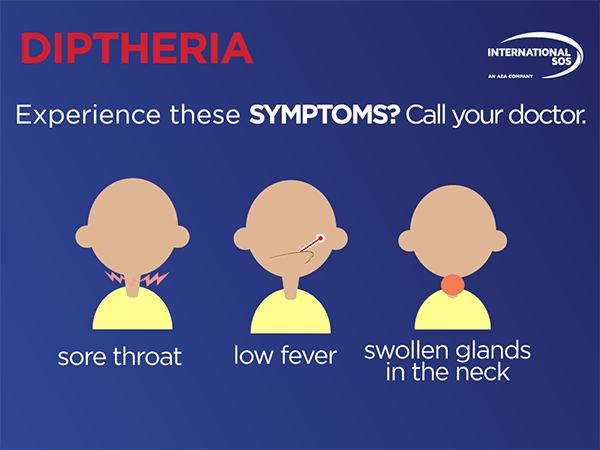Diphtheria
Prevention is key to avoid the disease
Diphtheria is a serious, sometimes deadly, infection caused by Corynebacterium diphtheriae bacteria. These release a toxin into the body that causes a range of symptoms. Most cases of diphtheria occur in non-immunized or inadequately-immunized persons.

Transmission
Airborne transmission is the most common way diphtheria spreads.It sometimes spreads via contact with contaminated objects like drinking and eating utensils or used tissues. More rarely, it spreads through contact with shared objects like doorknobs and toys. Infected people can pass along the illness for as long as six weeks, even if they have no symptoms. If an infected person develops skin lesions, contact with these sores can spread the disease.
Symptoms
It can take as long as ten days to develop symptoms once you get infected, but the average time between exposure to diphtheria and feeling unwell is 2 to 4 days.
Common symptoms include:
- sore throat
- low fever
- swollen neck glands
- grayish black membrane across the throat, nose, and/or airway. It can impede breathing and swallowing activity.
- double vision
- slurred speech
- shock
As the toxin spreads through the bloodstream, complications can occur in the heart, kidneys and other organs. These can be serious to fatal. Nerves may be damaged, leading to paralysis. About 5 to 10 percent of all cases are fatal.
Diagnosis
The illness is diagnosed usually through clinical examination. Samples from the throat or skin lesions are tested in laboratory for confirmation.
Treatment
Treatment usually requires hospitalisation. An anti-toxin, administered either intravenously or via injections, is used to deactivate the toxin already circulating in the patient's body. Antibiotics kill diphtheria bacteria within the body.
Prevention
Vaccination is the most effective way to prevent diphtheria and should be given as a routine childhood vaccination.
Ensure you are immune to diphtheria before traveling. If you have had contact with someone who has diphtheria, consult a medical professional to determine the appropriate personal preventative measures.
FURTHER INFORMATION
Members can login to the country guides to read about the updates about diphtheria risk in a particular area. Subscribe to email alerts for updates on outbreaks.

